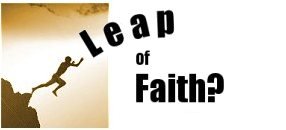|
Faith of any kind itself must have an object-- whether it is (minimally) the truth status of a proposition or (in more Biblical terms) a positive trust in the character, purposes, and love of the LORD God Almighty.... Though necessarily every person alive (including the most jaded atheist) decidedly lives by faith of some kind, the very concept that faith can be "blind" is nonsensical and even absurd. In fact, those who speak this way are often using a weak-minded rhetorical device rather than taking the effort to think clearly.
On the other hand, those who flippantly speak of a "leap of faith" do indeed have in mind some object of belief; however, this object they summarily dismiss as unworthy of the exercise of psychological risk... To such a hardened soul, faith beyond the empirical requires a "leap," by which is meant an abandonment of the rational mind. Whenever such a soul encounters a person of real faith, he or she must question the motives and intelligence of the person, resorting to ad hominem attacks and other weak-minded ways of thinking...

The term emunah (translated as "faith" in many English translations) occurs for the first time in the Torah in connection with Abraham (Gen. 15:6). What was the nature of Abraham's faith that God reckoned it as tzedakah ("righteousness)"? It is evident from the context that it was not merely a matter of accepting a series of propositions as being true (i.e., the Greek view of truth as "justified true belief"). Abraham did not encounter God as a Platonic Idea or an Aristotelian Unmoved Mover.... No, the context (the promise to the old man that he would be father of a multitude of nations) makes it clear that Abraham was declared tzaddik (righteous) because he trusted in God to do what He said.
The word emunah itself comes from aman, which means to securely trust or rely upon (and from which we get the word "Amen"). Abraham believed in a future state of affairs (a future-tense proposition) as expressed in his present trust in the Person and Promise of God. He foresaw the redemption of the world (the Messiah) and believed in God's promise of salvation (John 8:56).
Emunah is more like faithfulness than a static state of mind (i.e., the Greek concept of ascertaining truth). It is more "belief in" than "belief that."
The ideal Greek mind was caught up in the pursuit of a state of "epistemological bliss" or nirvana-like experience of the divine. Epistemological certainty was the goal (even those Greeks of the skeptical schools defined themselves in relation to this goal). The contemplation of the eidos (Forms or Ideas), archetypal patterns of all reality, was the good life. Pistis (the Greek word for belief) was merely a means to episteme (knowledge) and represented a lower-level of consciousness. "Faith" was the shadowy realm of the cave, the domain of opinion. Education and rationality were the way out the darkness and into the light...
The intellectuals of our day are inheritors (and epigones) of this earlier classical Greek mindset. Like the skeptics, they have abandoned the idea of objective truth, but unlike their predecessors, they redefine it (cynically) as any number of "narratives" which people use to interpret their environment. Even though they disavow allegiance to "truth," they unapologetically offer up the pretense that their intellectual nihilism is (ahem) true. The LORD will have words for them one day.
There are many who believe that there is a God, that this God created the universe, and even that this God redeemed humanity through the sacrifice of His Son, but there are not so many who personally trust that He will keep His promises to them....
The Scriptures obviously assume God's existence (and therefore are "prepositional" in their truth claims -- e.g., "God exists" is a true statement), but more importantly they teach belief in God as the One who personally makes promises... Emunah represents active trust in the goodness of the LORD and expresses itself as loyalty to His will. It is a gift from God, since it presupposes God's disclosure and revelation to the person who expresses it.
It's not enough to get our doctrines correct, in terms of objective correspondence to reality (though of course that is important and should be pursued by those who have the ability). We are called to have a vital relationship with the LORD God of Israel and to rely on Him to keep His promises made to us -- even in the "already-not-yet" state of our temporal circumstances. We express emunah by living our lives in conscious trust of the promises and Presence of the LORD.
|

